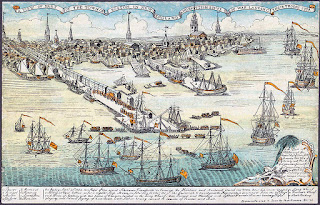Boston Massacre
Crispus Attucks
The Boston Massacre was a deadly riot that occurred on March 5, 1770, on King Street in Boston. It began as a street brawl between American colonists and a lone British soldier, but quickly escalated to a chaotic, bloody slaughter. The conflict energized anti-British sentiment and paved the way for the American Revolution.
 | |||
| Engraving by Paul Revere |
http://www.history.com/topics/american-revolution/boston-massacre
The Colonies Organize to Resist Britain
Sugar Act
Goal was to raise revenue for Britain, Colonists thought it was a trade regulation
Tax placed on molasses purchased from anywhere but Britain
Colonists continued to smuggle molasses from other sources
Stamp Act
 |
| George Greville introduced the Stamp Act as a means of increasing revenues from the colonies in the wake of the Seven Years War. |
an act of the British Parliament in that exacted revenue from the American colonies by imposing a stamp duty on newspapers and legal and commercial documents.
Purpose was to raise money for Britain
First time presented to colonists as a tax to raise revenue
Colonists boycotted Act and eventually it was repealed
The colonists protested and were angry about “taxation without representation”.
 |
| Paul Revere's 1768 engraving of British troops arriving in Boston was reprinted throughout the colonies. |
Quartering Act
 |
| Enforcing the Quartering Act |
required colonists to provide housing and supplies to British troops
1767 Townshend Acts
Placed taxes on certain goods like glass and tea
Colonists feared this money would be used to pay the salaries of royal officials
Resulted in the Boston Massacre where British soldiers killed 5 colonists
Eventually the Townshend Acts were repealed.
. 1773 Tea Act
Allowed a British company to sell tea without a tax
Hurt American tea companies
Resulted in the Boston Tea Party Protest
 | |||
| This iconic 1846 lithograph by Nathaniel Currier was entitled "The Destruction of Tea at Boston Harbor"; the phrase "Boston Tea Party" had not yet become standard. Contrary to Currier's depiction, few of the men dumping the tea were actually disguised as Indians. |
http://www.history.com/this-day-in-history/sons-of-liberty-dump-british-tea
http://www.boston-tea-party.org/sons-of-liberty.html
 | ||
| n 1973 the US Post Office issued a set of four stamps, together making one scene of the Boston Tea Party |
1774 Coercive Acts (Intolerable Acts)
Result of Tea Party – punishment for Boston
Closed Boston Harbor, changed the government of Massachusetts giving the crown more power
Scared all colonies that they would lose the little political power they had
Committee of Correspondence (1772)
The committees of correspondence were shadow governments organized by the Patriot leaders of the Thirteen Colonies on the eve of the American Revolution
http://www.history.com/topics/american-revolution/committees-of-correspondence
Formed in Boston to coordinate resistance to British Acts throughout colonies
First Continental Congress
Meeting organized by the Committee of Correspondence
Try to organize a response to Intolerable Acts
Met in Philadelphia in 1774 with 56 delegates from every colony but Georgia
Decided to boycott British goods, encourage the establishment of militias, and sent a letter to King George asking for representation in Parliament
 | ||
| Join, or Die: This political cartoon by Franklin urged the colonies to join together during the French and Indian War (Seven Years' War). Sons of LIBERTY Adams as portrayed by Paul Revere. 1774. Yale University Art Gallery |
 |
| 1st Row: Samuel Adams • Benedict Arnold • John Hancock • Patrick Henry • James Otis, Jr. 2nd Row: Paul Revere • James Swan • Alexander McDougall • Benjamin Rush • Charles Thomson 3rd Row: Joseph Warren • Marinus Willett • Oliver Wolcott • Christopher Gadsden • Haym Salomon |
 | |
| The Liberty Tree in Boston, as illustrated in 1825 |
 |
| Library of Congress Liberty Tree Monument |
Thomas Paine's Common Sense
He authored the two most influential pamphlets at the start of the American Revolution and inspired the patriots in 1776 to declare independence from Great Britain.[2] His ideas reflected Enlightenment-era ideals of transnational human rights.
Common Sense was so influential that John Adams said: "Without the pen of the author of Common Sense, the sword of Washington would have been raised in vain"
 |
| First Continental Congress 1774 |
http://www.ushistory.org/declaration/related/congress.htm




















No comments:
Post a Comment